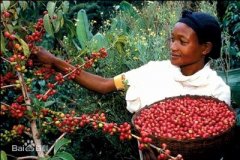Legend of coffee origin
There are several legends about the origin of coffee, among which the more familiar is the story of the shepherd: around 600 AD, a shepherd found that his sheep would hiss excitedly every night. In fear, he asked the priest in the temple for help. After carefully observing the sheep for a few days, the priest found that the sheep had eaten an unknown fruit. The priest ate some of it himself and found the fruit exciting. Since then, the priest called it "a sacred object that removes drowsiness and purifies the mind." since then, coffee has become medicine, food and drink. In 1200 AD, coffee was spread by a Muslim who had been exiled to Yemen for crime. From the origin to the Red Sea to Athens, Cairo, 1300 and then to Iran, 1500 or so to Turkey, coffee has gradually become a popular drink.

As for shops that sell coffee, the legend begins with Mecca, a Muslim shrine. Around the 17th century, coffee became more and more popular in Italy, India, Britain and other places through trade routes.
Around 1650, the first coffee shop in Western Europe filled with fragrance appeared in Oxford, England.
…… During the Renaissance in 1605, some Christians thought that coffee was a pagan drink and called it "Satan's drink" and asked the then pope to order a ban on it, but the pope who tried the "devil's drink" was amazed that there was such a delicious drink in the world, so he arranged a baptism and formally designated coffee as a Christian drink, extending coffee from Muslim areas to other areas.
The origin of the word coffee
The word "coffee" comes from the Greek word "Kaweh", which means "strength and passion". Coffee tree is an evergreen shrub of Capsaceae. Daily coffee is made from coffee beans combined with a variety of cooking utensils, and coffee beans refer to the nuts in the fruit of the coffee tree, which are then roasted with appropriate roasting methods.
Coffee epic
Espresso spitting smoke rings in the coffee shop, a cup of warm hands and warm heart in the hands of friends in the winter afternoon, or even busy regular days, messy desks quietly release a cup of soothing instant coffee, every day, all kinds of people, in different corners of the world, waiting for a good cup of coffee.
People who are addicted to coffee can never imagine how to spend the winter without coffee to keep warm. And even those who do not drink coffee can not help but smell the original aroma of their inspiration from the works of many writers and artists: Beethoven's music, Picasso's paintings, and Haruki Murakami's words.
For hundreds of years, coffee has changed history in a way that is the most subdued and gentle, but the most defenseless.
Important Notice :
前街咖啡 FrontStreet Coffee has moved to new addredd:
FrontStreet Coffee Address: 315,Donghua East Road,GuangZhou
Tel:020 38364473
- Prev

The history of coffee
The world's first coffee tree was found in the Horn of Africa. Local indigenous tribes often grind the fruit of coffee and knead it with animal fat to make many ball-shaped balls. These indigenous tribes use these coffee balls as precious food for soldiers who are about to go out to battle.
- Next

The coffee here is not just a drink.
As one of the three major hometown of overseas Chinese in China, Hainan's coffee culture has a direct relationship with overseas Chinese. This is one of the birthplaces of coffee in China.
Related
- How did the Salvadoran coffee industry develop in Central America?
- What exactly does the golden cup extraction of coffee mean?
- The Origin of Coffee flower
- [2023 Starbucks World Earth Day] there are more meaningful things besides free Starbucks coffee!
- What kind of coffee is there in Spain? 9 Flavors of Spanish Coffee
- Aromatic African coffee| Kenya's coffee culture and historical production area
- Liberica Coffee Bean knowledge: the characteristics of Liberian Coffee beans of the three original species of Coffee beans
- The origin and formula of Spanish latte introduces the taste characteristics of Bombon coffee in Valencia, Spain.
- How to adjust the solution of over-extracted coffee
- What is the tasting period of coffee beans? What is the period of coffee and beans? How should coffee wake up and raise beans?

